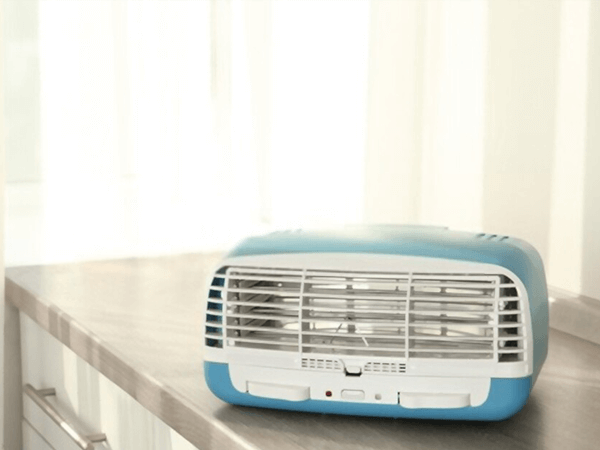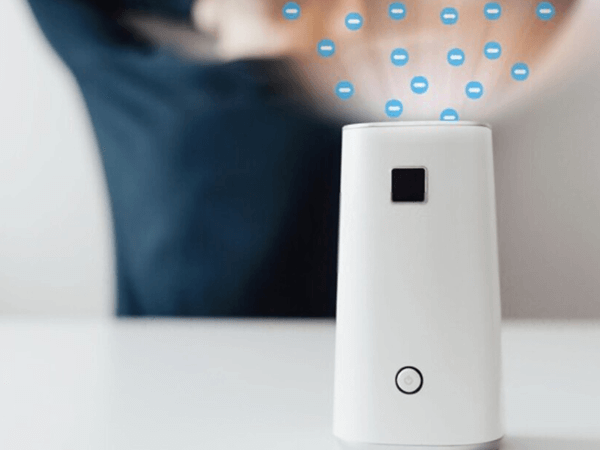Physical Address
304 North Cardinal St.
Dorchester Center, MA 02124
Physical Address
304 North Cardinal St.
Dorchester Center, MA 02124

We hope you love the products we recommend! We may collect a share of sales or other compensation from the links on this page at no extra cost for you. Learn more.
Before getting a complete idea of an Ionic air purifier let’s understand what is ionization. Ionization refers to any process that converts electrically neutral atoms or molecules (ions) to electrically charged atoms or molecules (ions) by acquiring or losing electrons.
An air ionizer, also known as an ionic air purifier, is a device that emits negative ions into the air. Negative ions cling to airborne particles, providing them with an electrical charge. Particles cluster together and become heavy as a result of the electrical charge, resulting in a fall from the air which assists the air purifier to capture the particles.
Ionization in air purifiers is based on the same principle with different approaches. Although Ionic air purifiers use negative ions, this principle can differ in many ways. Ionic air purifiers consist of two types of purifying the air. These are Photocatalytic oxidation and Bi-polar ionization.
Photocatalytic oxidation (PCO) is an air ionization method that employs photons of ultraviolet (UV) light and a catalyst made up of different reactive particles. This filtration process can be seen at the very end of an air purifier, when UV light photons strike the catalyst, negative ions are generated that cleanse the air and surfaces.

Bi-polar ionization is a different form of air ionizer technology than the PCO approach. It operates by charging two poles. To divide H20 water vapor into positively charged hydrogen ions and negatively charged oxygen ions, one is negatively charged and the other is positively charged.
When hydrogen and oxygen ions combine in an attempt to unite into H20 molecules, they attract airborne particles such as dust, pet dander, allergens, mold spores, and even bacteria droplets, causing the particles to expand and because of the weight falls to the ground.
Let’s see why ionic air purifiers have a difference in opinion when it comes to purification and health. With the process that happens inside an Ionic air purifier, it is deemed that ozone is a by-product of ionic air purifiers and this is considered a lung irritant.
Ionizers can cause a significant threat to the lungs and the EPA claims that at a given working condition these air purifiers can produce higher levels of ozone than normal. Ozone is also deemed unstable with three oxygen atoms where the third can easily break up and form formaldehyde.
Therefore, ionic air purifiers should be avoided at all times and especially some of the small portable air purifiers. These can be harmful in the long term. Although the process they are introduced is for cleansing air, ionic air purifiers may tip the scales for creating unfavorable conditions rather than a healthy environment.
Although Ionic air purifiers are deemed unsafe, they can be found in large industrial environments such as hospitals, technological environments, and paint companies. However, these ionic air purifiers are installed by professionals controlling the amount of Ozone and are strategically placed to maximize the elimination of contaminants.
HEPA purifiers are the best go-to option for air purification. HEPA filters are common in most air purifiers due to the quality of filtration. Most air purifiers will come with a combination of stages with ionizing capabilities and a HEPA filter to be more effective in removing pollutants.
Theoretically, HEPA filters can eliminate 99.97% of dust, pollen, mold, germs, and other airborne particles larger than 0.1 microns.
Contaminants are trapped by HEPA filters. Air purifiers pull in air and force it through a fine-pleated HEPA filter. Pollutants are captured when clean air flows through microscopic gaps in the HEPA filter. These filters should be cleaned and installed in the air purifier to maintain the efficacy of the process.
When purchasing your HEPA air purifier, it is important to consider the filter itself, without falling for the addition of the UV light as the process of the UV requires time to eliminate pollutants and this may not be effective when compared to the HEPA filter.
One other alternative for an Ionic air purifier is an air purifier that contains an activated carbon filter. Activated carbon filters can be more effective than HEPA filters as they can capture micro-level pollutants, gases, smoke, and VOCs.
To remove contaminants from the air, activated carbon employs the adsorption process. It resembles the process of absorption. The location where the fluid becomes trapped is the only distinction between them. When a fluid flows through or enters a liquid or solid absorbent, it absorbs. Meanwhile, adsorption occurs when atoms, ions, or molecules of a fluid adhere to the surface of a liquid or solid adsorbent.
However, since the small pores in the filters limits the movement of air the flow can be slow and limited. These filters can be used in cycles and eventually replaced with new ones.
Avoiding air purifiers entirely based on Ionization and UV light is a good practice. Fanless air purifiers might not be ideal for the job that it is intended for as the fanless air purifiers do not have smooth airflow despite being silent. This may seem like a good option, but it’s quite the opposite. Fanless air purifiers may underperform when purifying a room due to its lack of airflow, resulting in a waste of energy for little to nothing purification.
Ionic purifiers are not the ideal air purifiers that you should consider purchasing when considering one. We at AHC recommend purchasing an air purifier after an air quality check only as the need for an air purifier may not arise at all good ventilated or quality air surrounding. Therefore, purchasing an ionic air purifier is not at all recommend given that the harmful by-products may bring unnecessary breathing complications rather than the purpose of purifying the air.
It is ideal to consider air purifiers with HEPA filters or activated carbon filters on the contrary. Even though these filters require replacement over time this will provide a safer circumstance compared to Ionic purifiers.